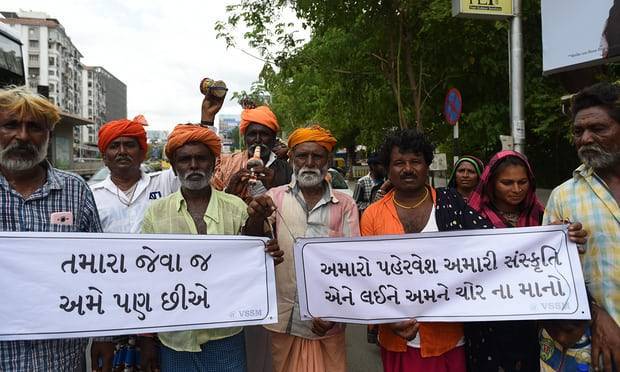Eight people have been killed across the country in the past few days, after rumours spread on the app about child kidnappers on the loose and a video was circulated that purported to show a boy being snatched.
In the past year the murders of at least 30 people accused of being “child-lifters” have been linked to the platform, India’s most popular social media app with more than 200 million users.
Police and state governments are scrambling to respond to the violence. One of the victims killed on Friday in Tripura state had been hired by the government to tour villages with a megaphone to try to dispel rumours that gangs of child kidnappers were prowling the area.
WhatsApp, one of the most-used apps in the world with 1.5 billion users, has faced problems with misinformation in other large markets such as Brazil or Indonesia, but the consequences in India have been far more violent than elsewhere.
In the latest incident on Sunday morning, five people belonging to a nomadic community were lynched in a remote village in Maharashtra state where police said messages about child kidnappers had gone viral.
The group had reportedly stepped off a bus and were talking to a girl when they were surrounded by a crowd of up to 35 people, including children, and beaten to death. The mob turned on police when they arrived at the scene, injuring at least four officers.
One video being blamed as a catalyst for the panic depicts a child being snatched from a south Asian street by two men on a motorcycle. The footage is part of a Pakistani child safety campaign; omitted from the version being spread on WhatsApp is a final scene in which the boy is returned.
The Facebook-owned social media app has become ubiquitous in India and been employed in innovative ways, including to assist rural doctors to get real-time advice from more experienced counterparts in cities.
But WhatsApp says it is limited in what it can do to stem the spread of harmful rumours without compromising the encrypted nature of the software. Last week it introduced a feature for group administrators to restrict who has the ability to post messages to others in the group.
It is also beta-testing a way to clearly mark out forwarded messages – as opposed to those written by the sender – to encourage people to apply scepticism to posts sent to them by trusted friends or relatives.
Ahead of the 2019 national elections, the app is also planning to partner with fact-checking websites in India as it did in the recent Mexican elections, where voters were encouraged to send rumours to a dedicated number which would provide factual information in response.
WhatsApp’s user base in India has nearly tripled in the past four years as smartphones have proliferated and the price of data has crashed. But the trend has posed serious challenges in a country “where digital literacy is next to nothing in many parts”, according to Pratik Sinha, the founder of the fake news-busting website AltNews.
“Because of the telecommunications revolution, mobiles have reached the furthest end of the country, but education has to go with it,” Sinha said.
The Indian government is yet to respond to the crisis but their state counterparts have been experimenting with different ways to douse rumours that could incite violence including education programs and police hotlines where hoaxes can be debunked.
Lynchings in India have become more prominent problem since 2015, when a Muslim villager in Uttar Pradesh state was killed by a mob after rumours spread that he was storing beef in his freezer.
In that case the accusation was spread by a loudspeaker from a nearby temple. But Mohammad Ali, an Indian journalist who is writing a book about lynchings, said that crime and the killings of the past months had a common thread, linked to rising nationalist sentiment in the country.
“Those who were lynched last month in Assam did not look part of the local culture,” he said. In Hyderabad last month, it was a migrant worker who was killed. In Maharashtra at the weekend, it was members of a fringe tribe.
“The idea is to target anyone who seems different,” he said. “It is part of a discourse of nationalism and extreme polarisation the consumes anyone seen as the other.”
More about: #India
















































